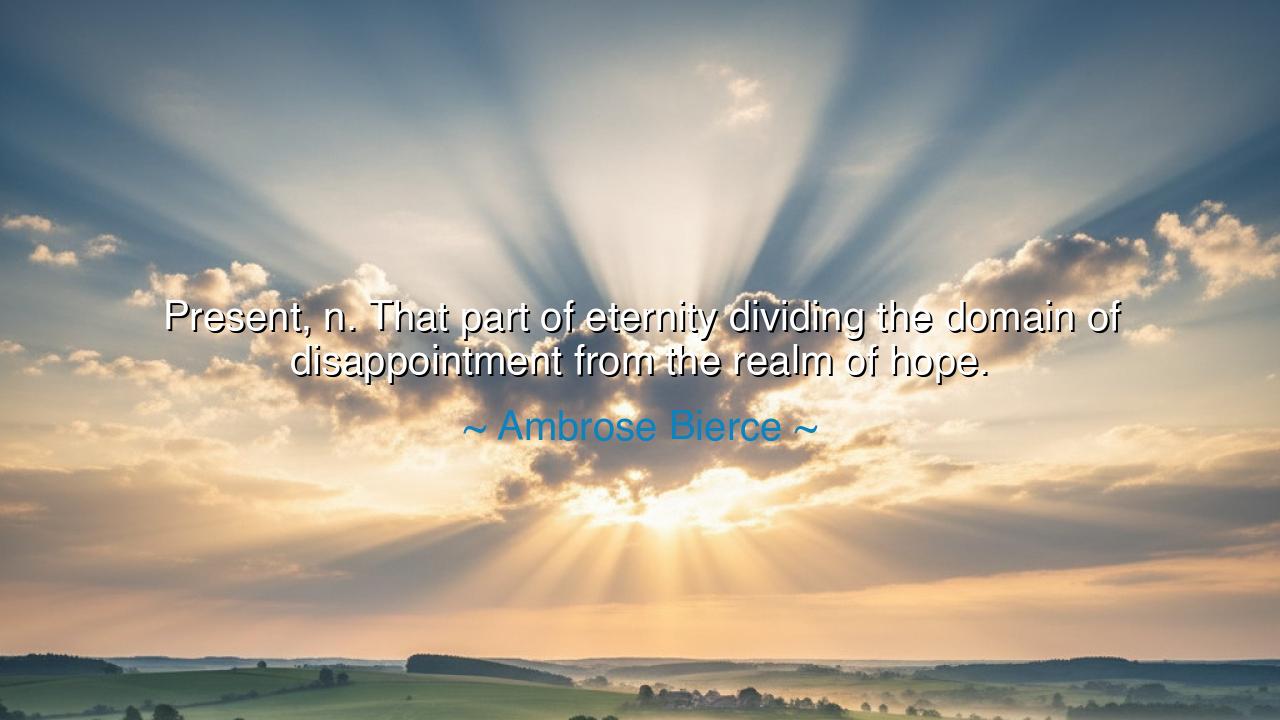
Present, n. That part of eternity dividing the domain of
Present, n. That part of eternity dividing the domain of disappointment from the realm of hope.






"Present, n. That part of eternity dividing the domain of disappointment from the realm of hope." – Ambrose Bierce
In these sharply insightful words, Ambrose Bierce, the master of wit and observer of human folly, captures the precious paradox of the present. He depicts it not as a fleeting moment, but as a bridge — a threshold between what has failed and what might yet succeed, between the weight of disappointment and the promise of hope. The present, he reminds us, is both a gift and a responsibility, a narrow span of time where our choices and awareness hold the power to shape destiny. It is the eternal fulcrum upon which life balances, delicate yet profound, ephemeral yet eternal.
The origin of this quote lies in Bierce’s life as a satirist and chronicler of the human condition in 19th-century America. He witnessed wars, injustice, and the fleeting triumphs and failures of men, yet he also understood the inexorable flow of time — that every moment carries both the residue of the past and the seed of the future. By defining the present as a boundary between disappointment and hope, Bierce reminds us that this is the only part of eternity truly within our grasp, the only domain in which our actions, reflections, and courage can act meaningfully.
This conception of time resonates with the philosophy of the ancients. Seneca, the Stoic philosopher, taught that we are mortals, yet endowed with the power to live in the “now,” to hold our attention in the fleeting moment and mold it with wisdom. The present, he said, is a treasure, for the past cannot be changed and the future cannot be claimed. Bierce echoes this vision, portraying the present as the arena of moral and existential choice, a slender line where human will can navigate the chasms of sorrow and the heights of aspiration.
Consider the life of Abraham Lincoln, who navigated a nation torn by civil war. Each day brought disappointments: battles lost, political resistance, and the death of friends and allies. Yet, within each present moment, Lincoln acted decisively, shaping policies, giving speeches, and offering hope to a weary nation. His greatness lay in his mastery of the present — the interval between despair and hope — where every decision was a step toward the preservation of unity and the promise of freedom. Like Bierce’s definition, Lincoln’s life demonstrates that the present is not passive, but charged with transformative potential.
Bierce’s definition also carries the wisdom of humility and foresight. By framing the present as the divider between disappointment and hope, he reminds us that life is temporal, uncertain, and balanced. To cling to past failures or to live solely in anticipation of the future is to forsake the power inherent in now. Each instant offers the chance to mend, to act, to align thought with purpose. The present becomes a crucible: what emerges from it — despair or hope — depends on the courage, mindfulness, and integrity of our engagement.
Furthermore, the quote illuminates the universality of human experience. Every culture and era confronts disappointment and longs for hope. Bierce’s sharp phrasing cuts across time, reminding us that all humans navigate this eternal interval, whether in triumph or suffering. The present, thus, is sacred, not because it is simple or tranquil, but because it is the stage upon which human resilience and creativity manifest. To understand this is to recognize that each moment is both fragile and powerful, the point at which history and destiny converge.
Lesson: My children, learn to honor the present as Bierce describes it — as the only time where your hands can shape the course of life. Let it be the moment where hope is cultivated and disappointment is tempered. Reflect upon the past, but do not dwell; anticipate the future, but do not cling. Act, observe, and choose within the present, for it is the threshold of all transformation. In every fleeting instant, there lies the power to turn despair into progress, failure into insight, and inaction into purpose.
In the end, Bierce teaches that life is measured not in years or achievements alone, but in the mindful navigation of the present — that narrow span where our courage, choices, and vision shape both the domain we leave behind and the realm we may yet enter. To live fully, one must step into each moment with awareness and intent, for it is here, and only here, that the human spirit can bridge the abyss between disappointment and hope, forging a path toward the eternal.






AAdministratorAdministrator
Welcome, honored guests. Please leave a comment, we will respond soon